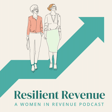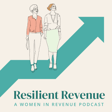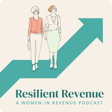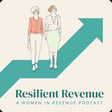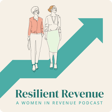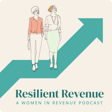Become a Creator today!Start creating today - Share your story with the world!
Start for free
00:00:00
00:00:01

From Networking to Net Worth With Andrea Galvez
Episode Summary:
In this episode, Andrea Galvez, VP of Client Success at Lionize, shares her insights on the importance of networking, the value of inclusivity in revenue generation, and the significance of continuous learning and growth in leadership.
Andrea emphasizes the role of champions in driving revenue and discusses her experiences with mentorship and the impact of communities like Women in Revenue on her career trajectory.
Key Topics Discussed:
- Networking and Career Growth: Andrea highlights the importance of cultivating personal networks, and shares how connections from Women in Revenue led her to a new job opportunity.
- Inclusivity in Revenue Generation: Recounting a story about gender biases in business discussions, Andrea emphasizes the need for diverse representation in client-facing roles.
- Continuous Learning and Leadership: Andrea discusses her passion for fostering a culture of learning and growth within her team, and emphasizes the importance of setting personal and professional goals with those on your team to help drive passion and purpose.
Are you actively cultivating relationships in your personal or professional networks that can help you grow in your career?
Consider joining communities like Women in Revenue to connect with like-minded professionals and expand your network.
Transcript
Introduction to Resilient Revenue Podcast
00:00:01
Speaker
Welcome to Resilient Revenue, a women in revenue podcast series designed to magnify the voices, victories, and valuable insights of trailblazing women in revenue-generating roles. Each episode will showcase stories of resilience, mentorship, and self-advocacy. You'll learn exactly how these remarkable women are breaking barriers, redefining success, and showing us the transformative power of unity within the tech industry.
00:00:31
Speaker
So join us as we embark on this enlightening journey toward equality and empowerment in the world of resilient revenue.
Andrea Galvez's Journey in Tech
00:00:42
Speaker
Hello everybody and welcome to the next episode of Women in Revenues podcast. And today we are actually connecting with Andrea Galvez. She is the VP of client success for lionize.ai, which is an all-in-one platform for brands to manage influence marketers.
00:01:05
Speaker
She's just started this role this week. So congratulations. And we're going to have a ton to ask about your previous roles as well, since you're just diving in here.
Navigating Gender Bias with Support
00:01:15
Speaker
But I guess I just wanted to start off with one of our core questions and just ask, what's an experience where you faced a significant challenge in your revenue generating role and what did you do to overcome it? And what did you learn from it?
00:01:31
Speaker
Yeah, first of all, thanks for having me on the show. Thanks for the congrats. Yeah, I'm in a state of transition, which I think a lot of people are these days. And wow, let's just dive in with like a really kind of gut richer question. So thank you for just going there. The answer I wanted to share for a significant challenge was something that I think so many women have come across and maybe were unwilling to name it and then
00:02:01
Speaker
in that that I experienced what I'll call gender bias. A lot of other women have experienced gender discrimination, gender bullying, things like that. Mine, I truly believe it was just a bias and a coworker that was blocking my path. And man, if you're out there and that's happening to you, that can be really tough because you doubt yourself.
00:02:27
Speaker
you doubt your quality of work? Is it me?
The Power of Allies and Relationships
00:02:30
Speaker
Is it my work? Is there legitimacy to this issue or this feedback, whatever it is? In my situation, I had a wonderful male colleague and ally who stepped in and I could gut chuck it with and was willing to say, you know what, I don't think this is you. This is something else. Let's figure it out. And so the lesson in there is to
00:02:53
Speaker
really take your relationship seriously and to find people who you can rely on that you can
00:03:02
Speaker
be truly yourself and honest and vulnerable with. Because otherwise, in those situations, if I hadn't had that, it could have derailed my career. It could have made me question how I was managing and the things that I was trying to accomplish. It could have really set me back. So keep your friends close, I guess.
00:03:24
Speaker
Wow. And being able to know, sort of attract your people, attract your community. Yeah. Yeah, absolutely. And I think I'm so incredibly lucky this human. We are really close now and I actually over time was able to address this. Couldn't in the moment. I wasn't personally ready to in the moment. I like was very shook.
00:03:47
Speaker
I think it also shows that like people can change and grow and like just because you've had one bad or multiple in this instance bad experiences doesn't mean you can't work with them although sometimes it does. It's just like a burden that we women and other people who might experience bias have to have to carry.
00:04:08
Speaker
Yeah, I think handling it that way, it's very humanizing.
Authentic Connections and Supportive Environments
00:04:12
Speaker
Like you're letting down your walls to be able to connect with somebody and just relate person to person. And I think when you're bringing that vulnerability and authenticity upfront, it gives people the permission to do the same. And I think it takes courage, it takes bravery and to be able to do something like that.
00:04:33
Speaker
Yeah, it's really hard. I think people like us, I'm going to lump us together, women who are in a revenue industry. There's so much pressure to perform, right? Like we're in front of clients every day and we have quotas to hit and like we've seen a lot or I've seen a lot of models which are
00:04:55
Speaker
hard, right? And so to try and be soft can sometimes feel foreign. And I personally have gravitated to this industry because I have a more direct personality. And so even for me, a little strange to like tap into that vulnerability and being willing to let people know that I'm not perfect.
00:05:22
Speaker
And so to like, let's open that up and be like, man, I need help. Yes. Wow. That piece right there, the asking for help piece that takes a lot.
00:05:34
Speaker
Because as somebody who has also experienced that, it does take a lot to just kind of be like, okay, I'm going to go out on a limb, and I'm going to take down these walls, I'm going to take down these barriers, and I'm going to not only lend an olive branch in the asking, but also even in just the asking, just showcasing the raw human in you of like, please,
00:05:55
Speaker
help me. I can't do this alone." That's
Balancing Masculine Metrics with Feminine Creativity
00:05:58
Speaker
so huge. I love hearing about that stuff. And it's funny that you had mentioned sort of the softness of it and the rigidness. And I actually earlier got off a call with one of my girlfriends and we were discussing how time and metrics just seem very masculine. Like it has a lot of like masculine energy. And if you're experiencing it, we're getting a little metaphysical right now. But like,
00:06:20
Speaker
But if you are experiencing time, time is relative, but like you can do something for like 20 seconds. It seems like it takes like three eternities or work at something for three hours and have it feel like it's three seconds. It's really all in your experience. So creation in and of that way is a very soft, like feminine type thing. And it just made me think of that. That's really interesting. That's super interesting. We could delve more into that at some point too. Yes.
00:06:48
Speaker
That could be a whole show. Yeah, no, absolutely. So it sounds like you overcame from it and you really learned from the experience. Was this person or did this person eventually become a mentor or like help with your personal growth in that way?
Mentorship's Role in Leadership Development
00:07:04
Speaker
So I believe in a philosophy of having multiple mentors, and if you're listening, I use the air quotes.
00:07:13
Speaker
They don't necessarily have to be named mentors that not necessarily have to be like you're all in incorporating like life coach and mentor and like there's room for people to have multiple people in their lives that they go to for support. And this person who helped me navigate the situation was a peer.
00:07:34
Speaker
but absolutely became like a support for me. And we still say in touch, although we both no longer work at the organization that this happened at. So you can get that from your colleagues. You can get that from people in your life who've been where you are now, who've gone further. I have had a lot of really amazing mentors in my life.
00:07:57
Speaker
I actually would like to touch on that. So would you tell me about a mentor or an advocate who has like really significantly impacted your professional development and what did that support look like and how did it shape your trajectory? Yeah. So because there's been really important people at different stages of my career, it's difficult to choose just one.
00:08:21
Speaker
But I'm going to give a hot shout out to Kelly Emery. She is the chief operating officer at the Financial Health Network. And what's super important in my leadership journey, I asked her to formally mentor me, which is not something I always do.
00:08:40
Speaker
right when I was leveling up from a senior director to a VP level. So that executive level leadership that I found people were saying, you need to learn. And I was like, well, what? Tell me what it is. And she helps me really see the bigger picture in things. So to pause, to remain what she's taught me, which is above the line. So thinking creatively and
00:09:09
Speaker
things aren't zero-sum and how you can be collaborative and really the things that you have to do when you're at the top of an organization, right? Like looking across multiple functions and divisions.
00:09:20
Speaker
And that has been really transformational for me, particularly in the last few years where I've been taking on more organizational leadership to think about it in a new way, but also to lean on her in moments where I was like, how did I do? Like you saw me in that meeting. How did I show up? Am I living up to these expectations that you have of what an organizational leader
00:09:45
Speaker
is. And so shout out to her. I love that. Shout out.
Strategies for Client Engagement and Success
00:09:50
Speaker
Wow. Yeah. And it is important to realize throughout your journey that you have different people helping to guide you and that you're able to like sort of lean on when times get tough, but then also just get guidance like at any point. So that's huge. Yeah. So you deliberately asked her, you were just like straight, what was it about her specifically that you're like, I need, I want your guidance.
00:10:14
Speaker
I need what you got. And so she showed up. This was at the Financial Health Network when I was there and she came in. And it was very obvious that she was just operating on a different leadership plane than I had been close to. And that
00:10:29
Speaker
As I said, that came out a little poorly. That doesn't mean that the people who I had been around weren't amazing leaders, but just she had a presence about her. And there were things that I had gotten feedback on or that I was self-reflective on that I knew I needed to work on. So like I mentioned, people had given me feedback about the next level of leadership. And I was like, I don't know what that means. But then I would see her show up in an organizational setting.
00:10:58
Speaker
where she was completely pulled together, she was 100% herself, like she had the brand of leadership that I wanted. And so that's when I was like, okay, I want to talk to you about this. And we had worked together. So we had a lot of opportunity to work together. And it wasn't like it, like I saw her once and asked her to mentor me. But over time, I did ask her to be a former mentor of me.
00:11:22
Speaker
I would love to jump into some of it. So this the topic of the episode today is all things revenue. Right. And so you're obviously in revenue. And as the VP of client success, your role is vital in driving revenue growth. Right. Could you share some key strategies that you've used to engage clients for long term success? And what are those?
Fostering Continuous Learning in Teams
00:11:54
Speaker
I love this question and I love that I'm getting this question as a client success professional because so much revenue sits over there in your existing clients. So all the advice that you're going to get out there that normal salespeople will drive around consultative listening and really discovering and like really hearing your customers and being responsive over coming off school. Like yes, all of that. Yes.
00:12:22
Speaker
I would say when you get into the post sales, some strategies that I've used that have driven long-term success because that was your question.
00:12:32
Speaker
are really about engaging your customers and co-creation. So what is the community that you're putting together? What is the advisory councils that you have in place? What is customer education that you're putting in place that you get people to weigh in on? How do they get to be a part of this thing that you're doing? That will create what I call champions. People who just love what you're doing.
00:13:02
Speaker
And your champions are your number one salespeople. Even like your best salesperson on the sales floor today, a current customer who loves you is going to be way better than them. They understand the product, they understand the pain point, like live and diet, and they had their pain point solved by your products. And that is so powerful. It's like a walking, talking case study. And so what you can do to cultivate your customer community
00:13:30
Speaker
is the place that I would be thinking about. I didn't even think about that.
00:13:37
Speaker
And that's so true, creating champions out of your existing clientele by having them weigh in on the product, the service, what have you. It is so important because it's not just like a one-sided conversation where the business is just shouting from the rooftops, this is what we do. It's also that echo back and that open dialogue with the people who are utilizing the service or product. And I think that's really cool.
00:14:02
Speaker
That is really cool. Wow. I just learned something today. So let's move into cultivating off of that learning and growth, right? So learning and growth from sort of like the existing client perspective. But now on your LinkedIn profile, you mentioned your passion for creating a culture of learning and growth.
00:14:23
Speaker
Yeah. How is it that internally you inspire continuous learning within your team and how does it contribute to revenue generation and client satisfaction even? Yeah, I love this question. I'm super passionate about team building.
00:14:39
Speaker
So I think this all starts with the leader. So I've said this elsewhere, I'll say it 100 times, if you're gonna go into leadership, the most of it is about self management, like what you do with yourself. So I would start there. Okay.
00:14:56
Speaker
And so this is about modeling. How are you showing your team that it's OK to try and take risks and fail? And so an example of how I do this is I'm onboarding into a new team right now. First day, first thing I did, I shared my user manual, which includes things I'm working on, things that I'm not good at, things I need their help with.
00:15:25
Speaker
And then typically, and I'm still putting this into place at my current team, we sit down and have a pretty large conversation when I say large, meaning not long, but in scope. So not just defined or their current role, but what do you want to be in the world? Where do you see yourself?
00:15:47
Speaker
And these questions are really tough right now because the world seems so uncertain. But what are your interests? What are the things that you really like about your current job and the job that you see like the next job? And then putting goals around that, individual goals for everybody on the team.
00:16:04
Speaker
which seems so basic. Like every time I see this, it's like, well, yeah, you have goals. But most of our goals are like revenue goals, right? Or business goals. So how do you make space for this person to have a goal that they feel super passionate about, that's going to get them where they want to be in the world, but also helps the business and that is
00:16:29
Speaker
that like threading the needle, that as leaders you can help people do, you can help the business, you can help your people, you can usually help yourself in the process too. And so those are some tactics that I use to cultivate risk-taking and continuous learning.
00:16:47
Speaker
Wow. So you're leading by example. And also, I feel like there's such vulnerability in that leadership style of showing them something that you're working on and showing them areas in which you would want help and then reaching out to them as a human.
00:17:04
Speaker
Right? And just being like, what are your goals as a human? Not necessarily exactly like within this company. And I think that that also helps create or cultivate a very high growth mindset versus a scarcity mind. Like you, I only want to talk about your goals and your metrics within your current job function. Right. Wow.
00:17:23
Speaker
This is really hard because we all have really busy jobs, right? And so I found that it's not helpful to do that exercise and that just like once and then forget about it. Like you have to be intentional. You have to check in on the goals. You have to do it in the next year. You have to be responsive. This is really cool. Sometimes I've set these goals and people have been like, I want to be product person.
00:17:48
Speaker
And then not right now, right now I'm like, okay, let's figure out how to do that. So like you, you like set them off on a plant that first step and they come back and they're like, Nope, don't want to do that. Okay, cool. And so you have to check in to which is the hardest. It really that's the hardest part, but it's worthwhile for sure. Wow. That sounds amazing. Wow. So going from
00:18:17
Speaker
sort of client facing to facing internally and growth, right?
Leveraging Networks and Community Involvement
00:18:22
Speaker
Let's touch base on your career growth from a networking perspective. How is it that you've utilized your network in the past to help foster the career growth that you've experienced? Yeah.
00:18:40
Speaker
So here's the thing, people in sales and revenue and all of its forms understand the value of relationships, right? Like we're like, we're going to write down how many kids they have. We're going to write down their dogs. We're going to remember their dog. Like we get that.
00:18:55
Speaker
But when you apply it to your personal life, I don't know. Somehow for me, that was broken. I was like, oh, I went to this conference and saw these people and I'm following up all day for work. I forget to follow up on like my contacts, right? And so the pandemic was really a moment for me to reassess how I was giving back to communities and also the relationships I wanted to keep and cultivate.
00:19:25
Speaker
About that time, I found women in revenue and has been a really inspiring community to be a part of. You see these women doing things that you're like, wow, I'd love to do that someday, but also super welcoming. I think one of the things I decided to do was be more intentional on the communities that I was a part of.
00:19:51
Speaker
So women in revenue was top of that list. There were a couple other, at the time, digital or online communities that I've joined on tech being one of them and have really just gotten so much out of that. So I've given a lot. I've been the one who's always like, here's a question. Let me answer it. This is what I know. Let me connect the person that I think might have the answer. But then whenever I have a question,
00:20:18
Speaker
people are doing that back for me. And I actually found the job that I am starting, I just started via a connection from women in revenue. So I saw or I had connected with another person in the community. And she saw a role was like, Hey, you might be a good fit for this. And so that was not why
00:20:43
Speaker
I joined, but it's a really happy outcome. And so I would encourage everybody out there who's thinking, oh, I don't have time, or if you're looking for a new job or not, if you're just thinking about how to progress in your career, to really think about cultivation of your personal network as well.
00:21:02
Speaker
Yeah, absolutely. I mean, the more people you meet, the more opportunity abounds, whether for career advancement, but also just to learn in general. Yeah, all the time. Yeah. I expect to be tapping into my network deeply as, I mean, as you onboard into a new role, there's all kinds of new ideas and questions and how have you done this and how have you done that? And I'm excited that I have a network of people who I can lean on.
Inclusivity's Impact on Excellence
00:21:30
Speaker
Love it.
00:21:30
Speaker
In your experience, how does inclusivity contribute to excellence in revenue generation? And how has fostering inclusivity positively impacted your team or organization's performance?
00:21:46
Speaker
Yeah, this brings to mind, probably four or five years ago, I was talking with a male executive, and we were actually in the middle of a bias training. So as an organization, we're going through bias training.
00:22:02
Speaker
And he was like, wow, I've never thought about this. But now if I am reflective, I can't even number the times when I've been at table and there have been a group of people and the women executives get up and walk away. And then the male executives are like, okay, now let's get down to business.
00:22:23
Speaker
And I was shocked. First of all, I was like, holy smokes. Wait until we leave to talk business? I have no idea. I don't know if that's every industry, every business, you know, all of those things, but just that he was willing to articulate it first was like, thank you. True. I like this. He was like processing and really being willing to name it.
00:22:49
Speaker
But I think there is a tendency or I have seen some people approach sales, revenue, post sales roles, client facing roles to say, oh, I need somebody that looks like my client or that talks like my client or that my client would understand. And maybe they don't say in their mind like I want a man or not a female.
00:23:18
Speaker
But they're thinking, what are the ways that I can best put my organization in a position of strength to build relationships with clients? And I'm so grateful that the world is changing and that I was not born 30 or 40 years before I was born because I think it would have been extraordinarily difficult then for women who want to do the job that I'm doing today.
00:23:46
Speaker
But I think as a leader, I get the opportunity to flip that. So what are the ways that I can challenge that? So I have been really intentional with the help of a lot of really amazing talent people. And I just did a LinkedIn post naming all of them that have taught me ways to really counteract bias in the hiring process, which is super important, but then cultivate inclusivity within team building as well. And so.
00:24:16
Speaker
The things that I've seen by having an inclusive team are really divergent thinking, people challenging me on the ways that I would approach something that were way more successful than what I would have done. And the opposite, when people are like, oh, I would do it this way, I can raise my hand and say, you know what, you might want to try this other thing.
00:24:37
Speaker
being willing able to see multiple points of view, to think really creatively to find the best solution, not the same solution that has been in place forever, I think is a huge differentiator for a revenue team. So it's definitely diversity of all types is super important to me on my teams. And that includes
00:25:01
Speaker
people who live with disabilities, people who aren't the same color as me, people who live across different geographies, and of course, different gender and sexual preferences. All of that, and more than I'm not listing, is really important in order to make sure your team is really thinking cohesively about the client.
00:25:29
Speaker
You never know who is going to be on the other side. You are selling to a human too. And so I think that's really an important thing to remember. Get a wide breadth of experience for a multifaceted collection of clients, I think is huge. It's huge.
00:25:47
Speaker
Wow. Okay.
Overcoming Gender Bias with Community Support
00:25:48
Speaker
So going off of that, I wanted to move into our final question about navigating gender challenges in revenue roles and be able to close out with what you would say to other women aspiring to excel in a similar role. But as a trailblazing woman,
00:26:07
Speaker
in a leadership position, you've undoubtedly faced unique challenges on your path to success. How is it that you have navigated gender-related obstacles in revenue roles, and what advice would you give aspiring women seeking to excel in similar roles?
00:26:28
Speaker
Yeah, we talked about this at the top. So kind of see first question. But also I would say to first of all, educate yourself, be really clear about what gender bias looks like. Because I think, as I mentioned at the top, sometimes I would experience gender bias and just be like, oh, they don't like me. Right. So
00:26:56
Speaker
There's a sense of being able to spot it when it's happening so that you don't let it tear you down. Now, once you spot it, it's a whole other like, well, what do I do with it after I recognize what this is? And for that, my advice for women out there who are just getting started in their career, been there for a while is to have a strong community that you can turn to. So that might be peers, that might be mentors, it might be a boss.
00:27:26
Speaker
if you can find a job, a company that cares about this and that you have support from the top down to try and correct this throughout the organization. But the truth is, I don't think in my lifetime this is gonna go away. This is gonna be something that we all have to think about. And so I would encourage people to have people they can turn to in the moment.
00:27:52
Speaker
and not just other women. I mentioned a couple of different men in my life who've been strong allies in moments when I needed them, and that can be incredibly powerful. So make sure you're cultivating all types of relationships.
00:28:06
Speaker
And then the other thing I would say is just because you're a woman and you might be experiencing gender bias doesn't mean that you can't also perpetrate gender bias or other bias. And so part of that education is also learning to spot bias in yourself and really finding ways to like stop that little voice in your head before it comes out or you actually take the action.
00:28:32
Speaker
I think often there can be a conversation about like, oh, women have it so tough in the workplace. But then also we make it really tough for others sometimes too. So recognizing and remembering both sides.
00:28:47
Speaker
Yep. It has to be on both sides. I totally agree. I feel like we've covered a lot, but I wonder if there's something in there that you're like, this needs to come out. And if not, that's fine. But if there is, I want to leave space for that.
Advice for Remote Career Starters
00:29:04
Speaker
I would say...
00:29:06
Speaker
especially for women who are just starting out. And I feel like this is really cute right now, when people are still starting their first job remote or figuring out how to navigate office politics via Slack. For those, I would say
00:29:26
Speaker
ask for help. So this goes back to our earlier conversation about recognizing when you need help. But I would say like doubly so for that specific demographic because my heart just goes out it because I learned so much by just
00:29:43
Speaker
seeing other people do it or watching or asking questions when you're physically in the same environment and that's really difficult remotely and I also feel like it can feel like a bigger ask to send somebody a slack unannounced than to just like swing by their office and wave and see if they look up and I think other leaders would say like ask more often and
00:30:09
Speaker
come to me more often than you think is necessary because I personally would want to help people who are struggling. It's better for the company. It's better for the team to help people who are struggling or just not self-confident rather than just letting them sit in that. So raise your hand. I love that. Thank you so much for spending time with us. This was so much fun. Thank you so much for having me. Of course. Of course. Andrea Galvez, everybody.
Conclusion and Call to Join the Community
00:30:37
Speaker
And that wraps up another episode of Resilient Revenue. These narratives are more than just personal triumphs. They embody the collective journey that we undertake as we strive for a future where every woman, no matter her career stage, location, industry, or demographic profile, has the opportunity to excel in her chosen field.
00:30:58
Speaker
Women in revenue exists because we know amazing things can happen when driven, talented, bottom line oriented women are fired up and collaborating to grow their careers and organizations. We invite you to join our amazing community of 7,000 plus members. If you'd like to become a member for free, head on over to womeninrevenue.org to join today. See you next time on Resilient Revenue.
